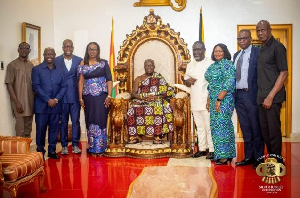Diasporia News of Tuesday, 28 June 2011
Source: Owusu-Ansah, Emmanuel Sarpong
Flown in Partners of Immigrants Stand Accused
Following the publication of the findings of a research investigation into the escalation in the number of unattached African women in the UK, some concerned Africans got in touch with me to draw my attention to one other important issue, challenging me to investigate it. It is a common practice for Africans in relationships to arrange for their partners to join them soon after setting foot on the shores of industrialized countries. Others find lovers in their home countries while still in diaspora usually through the internet and sponsor the lovers to join them in their new world. Unfortunately however, many of these marriages or relationships collapse shortly after the partners are reunited or united with their sweethearts. Why are these terribly unfortunate anti-climaxes persistently occurring if not increasing?
In my bid to know and understand the cardinal causes of these disturbing and heart-breaking happenings, a number of marriage counsellors, and divorced men and women in the UK, USA, Italy and Holland were interacted with, mainly on the phone. This article thus summarizes the findings (only the findings) of the quick research investigation and some practical recommendations. The rationale is to raise awareness of these potentially life-threatening occurrences and to educate the general public, especially those making preparations to join their partners abroad.
Generally, when arrangements are made for a person in an African country to join his/her partner in the western world, the entire cost or greater part of it is borne by the party in the West. Statistically, more than 50% of marriages and relationships collapse shortly after the parties are reunited or united in western countries. Only about 15% of the African immigrants in western countries who arrange for their partners to come and live with them are women, the remaining 85% are men. A number of reasons have been identified for the low percentage of female immigrants willing to spend money to fly in their partners. Among them are, 1. financial difficulty, 2. unstable legal status, 3. “negative” family influence, 4. fear of losing partners to other women, 5. “over-determination” to secure properties in home countries (e.g. pieces of land, buildings, etc.), and 6. the traditional notion that men should spend on women and not vice versa.
However, the first 4 factors have been vehemently discredited and rubbished by a number of people who argue that male immigrants in western countries also face all those hurdles or challenges plus many more, yet they make the effort to bring their female partners to their various countries of abode. As a matter of fact, almost 50% of the male African immigrants who make arrangements for their wives or partners to be with them have no financial stability or security and no legal status. It could nonetheless be understood that women, unlike men, are easily influenced by their families, particularly their parents to ignore their partners at home and rather think about helping their own siblings to make it to the West. It has also been argued that partners could be snatched away even in their various home countries in Africa, and that the fear of losing partners to other people is felt even more by men.
The last 2 factors are probably the major reasons women do not make much effort to fly in their partners. It has in fact been established that women are most likely to choose the completion of say a building project over making plans to get their partners flown in, if they have the means to do one. This point also raises the question as to whether or not African men love more than their female counterparts. Some people have in fact expressed the opinion that men generally think about the wellbeing of their wives or partners more than their wives or partners think about their (the men’s) welfare, adding that women in diaspora are much more likely to fall for another man and completely forget about their husbands or partners at home (in Africa). But since this clearly is not the subject that this article seeks to address, readers are invited to give and substantiate their individual responses.
Why Marriages Breakdown after Immigrants are Reunited or United with their Partners
For some African immigrants in industrialized countries, the greatest decision they ever made was arranging for their partners in Africa to join them, as things have been moving perfectly well and smoothly for them following the arrival of the partners. However, many have cursed and continue to curse the day they made up their minds to bring their partners over from Africa. If they knew a couple of months or years ago what they know now, they would have kept their partners where they were and happily continued with the $100 monthly remittance to them.
A number of factors have been identified for the breakdown of marriages soon after the couples are reunited or united in western countries. The following are some of the key factors: men lording it over their partners and supressing their freedom, or domestic violence; women’s unwillingness to make financial contribution towards the upkeep of the household as they hold on to the traditional African notion that it is the responsibility of only the man to handle all household expenses; flown in partners making too many friends and taking bad advice from them; laws of western countries favouring women; negative family influence and superstitious beliefs; unfaithfulness – womanizing or ‘manizing’; the poor living condition of the host partner; sheer greed, particularly on the part of the women; falling in love with the wrong person; and lovers not getting the opportunity to know each other well before they get married or engaged.
Watch out for the subsequent article which presents a quite interesting and detailed discussion of the above listed and other factors plus some recommendations.
Readers are reminded not to confuse a research publication on news websites or in newspapers with research works designed to be published in academic journals or books. Articles for online news portals unlike the latter (articles for academic purposes, or for publication in journals or books), are meant to be brief, simple, and to be understood by a significant number of ordinary people or “non-academic brains”. I thus do not expect readers to demand a literature review, detailed research methodology, technique for data analysis, and the full collected data. As a matter of fact, over ten thousand (10,000) words would be required if all those information were to be included in this publication. I doubt if any time-conscious person or people who are not very academic minded would read such a voluminous work on an electronic news portal. Be informed however that detailed reports of some of my research investigations have been published in various academic journals and books, and others are expected to be compiled and published in similar literature in due course.
NB: No part of this piece may be reproduced without fully crediting the source: the author.
GOD BLESS MOTHER AFRICA
Emmanuel Sarpong Owusu-Ansah (aka Black Power) is a lecturer and an investigative journalist in London, UK. He is the author of ‘Fourth Phase of Enslavement: unveiling the plight of African immigrants in the West’










